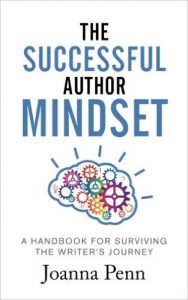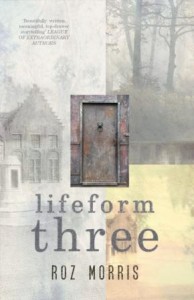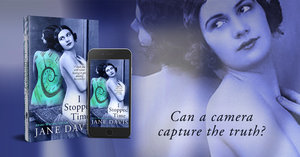In May 2016, while completing the final edits for my novel, My Counterfeit Self, I learned that my 2015 novel, An Unknown Woman, had won Writing Magazine’s Self-Published Book of the Year Award. They called it ‘an outstanding publication in every way.’ But, even as I was cracking open the champagne, the devil on my shoulder was busy hissing: ‘Nightmare. That’s not the kind of pressure you need right now.’
I’m not naïve enough to think that An Unknown Woman was actually the best. It was the book a particular panel of judges ruled to be the best offering from those who had heard about the competition, had a title that met the strict competition requirements, and whose entry didn’t get lost in the post. That isn’t to say I’m not incredibly proud of the award. On the contrary, it’s one for the whole team. Andrew Candy’s cover design had already won two prizes. As for quality, as far as I know, I had somehow managed to confound Gaiman’s Law. You know, the one that guarantees that when you open your brand new book at a random page, a glaring typo will leap out at you. That’s impossible. It can’t be down to attention to detail. It was a fluke.
But there was more to come. After a slow start, An Unknown Woman was at last garnering glowing reviews. In August, Book Viral wrote: ‘For readers looking for a novel with a deeper subtext, this is as good as it gets.’ Again, at the moment I should have been crying tears of joy, that small insistent voice started nagging: But what if it is as good as it gets? What if you’ve peaked?

Joanna Penn defines the three fears every writer has to face as ‘self-doubt, fear of judgement and comparisonitis.’ She’s even written a survival handbook for authors. Shouldn’t we feel better knowing that we all go through this? To find out, I asked fellow authors to set aside their sunny social media images and come clean about how self-doubt affects them:
I’m not alone in feeling that success increases the pressure, especially when it shows up early. Charles Booth, whose debut won three awards, says:
‘Weighed heavily writing the second. Felt. It. Everyday.’
Apparently the very fact of being under contract and knowing your second book is actually going to be a book can be a major cause of anxiety, as this piece by Kathleen MacMahon demonstrates.
I’ve often wondered if I put myself under unnecessary pressure by writing standalone titles, but it seems I’m wrong. Jean Gill is currently embarking on the final installment of The Troubadours Quartet. Book 3 was longlisted for Historical Novel Society’s Indie Book of the Year and the Readers’ Favorites 5* review called it ‘the best historical novel this year’. Instead of celebrating, she’s busy fretting, ‘How do I make sure the last book (in the series) is a firework and not a damp squib?’ And in writing the sixth of her Beatrice Stubbs crime novels, JJ Marsh seems to have identified a new type of pressure entirely, claiming it comes from her main character. ‘While each novel is a standalone, the eponymous mc changes and develops in each. Readers say the best thing about the books is Beatrice, so I get very nervous how she’ll be judged for her moral decisions. Sometimes I want to plead extenuating circumstances. “Frankly he had it coming!” or “It was only a kiss, Your Honour.”’
For US mystery writer, Kassandra Lamb, the issue is coming up with new ideas. ‘The twists and turns have to be bigger and better. I know I’ve grown as a writer, but developing the plots seems to have gotten harder and harder.’ In fact, fear of not being able to repeat past successes may be nothing short of paralysing. Kay Seeley told me, ‘I’m so scared of the next one not being as good that I can’t even start to write it.’
Self-doubt has no sell-by date. Sometimes, once the book is written, it intensifies. As Jessica Bell explained, ‘The pressure gets so much that I’m willing to do myself a great injustice and release my books without telling a soul. The expectation of ‘selling’ grows bigger and bigger with each release. What was ‘let’s publish and see what happens’ at the beginning of my career has now become ‘if this doesn’t sell more than my last book I will feel like a complete failure.’

I hadn’t even begun thinking about sales! Perhaps I should. As Roz Morris explains, ‘When My Memories of a Future Life came out (2011) it was much easier to sell indie books. By the time Lifeform Three came along (2013), the indie outlook had changed a lot. They might as well have been released on different planets.’ Most authors have seen a downturn in sales, and when that happens, and there are no signs of recovery, you have to ask yourself, is the effort worth it? In this article for Marie-Claire, Merrit Tierce talks about the constant juggling act that is finding the money to pay the bills and having enough time and creative energy left over to write. Karen Myers longs for a crystal ball: ‘If I could get a note from, say, three years in the future, telling me this (blip in sales) is all temporary and local, and that I’d get to some sort of steady state once enough books were out, it would make all the difference in the world to me.’
We writers are fragile souls. As Sue Wickstead points out, ‘Every positive reaction gives you a smile inside but just the one criticism can knock you back down with a bump!’
Of all the comments I received , it was Anne Stormont’s that really resonated with me: ‘It’s more a desire to feel I’ve produced something I can be proud of and convincing myself that my pride is justified. I also need to have at least one other person like the book and to have ‘got’ what I was writing about.’ One of my own proudest moments was receiving a review of I Stopped Time from a photographer, saying that it had expressed everything she felt about her art. She got it. Or perhaps I got her. The two seem to go hand in hand.

Since I first turned self-publisher is 2012, my fears and doubts have changed. I’m no longer afraid of the technology. I don’t wake up in a sweat, worrying that I haven’t bought the right licence for the cover artwork, or obtained the correct permissions to quote someone. Actually, that’s a lie – but I do know I have a great team around me. I have the process down to pat. The fear has transferred itself to the work itself.
Can those feelings be put to any positive use? I think so.
My forthcoming release, My Counterfeit Self, tells the story radical political poet, Lucy Forrester. To bring her to life, I’ve used all of my doubts and fears, writing about how it feels when you show your work to someone for the first time. How you manage to convince yourself that people will like you less when they understand what’s going on inside your head. I suppose you could say that I’ve drawn on my experience of winning the Daily Mail First Novel Award. The suggestion that I had jumped some kind of queue. The reviews that said the result was a fix, and that I must have been related to the judges. I wanted to say to those people, ‘I didn’t enter with any expectation of winning.’ You see, my manuscript had been sitting in my agent’s in-tray for six months and she hadn’t found time to read it. No, I entered out of sheer frustration.
A short extract from My Counterfeit Self: Lucy receives a letter from the poet, Edith Sitwell
Lucy swallowed and took the letter solemnly.
Dear Lucy,
You have already done one of the bravest things you will ever do, and that is to show your writing to another living person for the first time. It is an act of trust which says, ‘Here. This is what I look like on the inside, I make a gift of my soul to you.’ And while you fear rejection, you hope against hope that you won’t be mocked or shunned.
The first person had been Pamela, and Pamela had wanted to know what she looked like on the inside. But when she’d made a gift of her soul to Father, he had gone to hand it back.
It was not your choice to share your work with me. I find myself imagining how I would feel in your shoes. Betrayed? (I hope not, because your governess seems to care very much for you.) Pleased that she thought she had recognised something rare and wanted another opinion? Nervous of the reaction of a stranger? That goes without saying. So let me put you out of your misery.
Your poem spoke to me – and by that I mean directly to me.
A small core glowed bright within Lucy. She had swallowed the moon. Father had been wrong.
It has that certain something I always look for but is so difficult to pinpoint; more of a feeling in my gut than recognition of technique. If you really do grab sentences from the air and manage to get them down on paper with such clarity, then you have something special, something that can’t be taught.
Keep doing whatever it is that you are doing. Practise your craft every day.
The face Lucy conjured to go with the voice was solemn, with deep-set eyes. Very much like Virginia Woolf.
You may be tempted to censor your work, now you are aware it will be read by others, but don’t hide whatever is strange and wonderful and unique about you. Never feel ashamed. Not everyone will love you, that’s true, but the thing that sets you apart is the very thing that will touch every other person who is unable to voice what you have already grasped. When Emily Dickinson wrote, ‘I’m Nobody. Who are you?’ she invited all the misfits into her world. The misfits are your people too. Don’t be put off by this word. Celebrate it. If all this advice feels overwhelming, imagine somebody exactly like you on a small island somewhere, and that you are writing for them and them alone. Find simple ways to say what you feel. Give your words room to breathe.
Perched on the very edge of her seat, more flustered than Lucy had ever seen her, Pamela asked urgently, “What does she say?”
But Lucy wasn’t ready to share these promise-filled words. “She suggests I read Emily Dickinson.”
“Good.” Pamela nodded. Here was the instruction she had been waiting for. Something specific to work on.
One final piece of advice, Lucy, if I may. Less venom, more sorrow.
~~~~~~
For me, it’s not just a question of wanting to develop as a writer, or maintaining those outstanding production standards Writing Magazine so kindly applauded. Now that I have an audience, I don’t want to let them down. But I also feel a wider responsibility. If I release a book that isn’t as good as it can possibly be, I not only damage my own reputation, but the reputation of the industry as a whole.
The greatest advantage of self-publishing is creative control, but there’s a pay-off. No matter how many professionals I employ, the ‘self’ part in self-publishing is that only I can decide when to hit ‘publish’. That’s my loneliest moment.
My Counterfeit Self is released on 1 October 2016, but you can pre-order the eBook now at the special price of 99p/99c.




2 comments
Great, honest post, Jane. Thanks for the mention. I was touched by your response to what I said.
I sometimes think producing a book is like producing a child. You want people to like your offspring and to approve of you as a parent. But there comes a time to let go and trust your child to stand alone. You will never be a perfect parent/author but you just need to be good ENOUGH.
You won the competition. You deserved it. Enjoy it.
Shame and anxiety are horrible. They need kicked off the park. A wise one once said to me ‘just get on with your life.What other people think of you is none of your business.’ Easier said than done but worth trying to remember.
All best for your new ‘baby’ 🙂
I’m going to give you a present that I’ve earned by accident: write the fears down, and then ignore them.
The fact that you have fears just means you really, really care about what you write.
But long illness has made me drop most things which have no real value, and fear is one of the ones I’ve tossed. The only fear I have left is that I will not longer be physically able to write, and if that happens, and I can’t do anything about it, that will be that.
Meanwhile, though, fear likes to be acknowledged (which is why I write it in the Fear Journal), and it is wonderful for keeping myself writing during the hard parts, because fear means I haven’t finished digging deeply through the scene – it goes away when I’ve finally figured out what’s missing and have written it. So I use it as a touchstone, thank it, and KEEP WRITING.
And give it to my characters, of course.
Just never let it do anything other than remind you that you’re on the right path.
Alicia